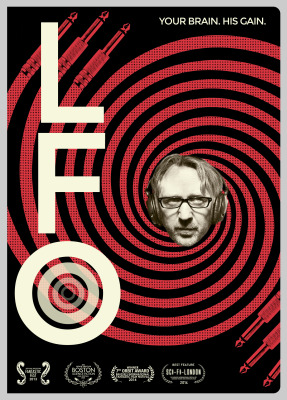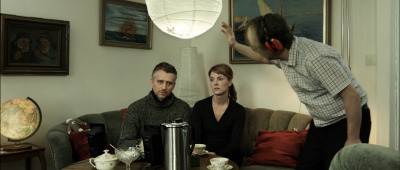LFO – a high-quality, low-fi science fiction black comedy (Eclipse gave it an A following its appearance at the Calgary International Film Festival) – works just as well on a small screen as it did in the theater because for all that it successfully achieves its ambitions, it is an intimate study on one man’s descent into madness.
LFO is a gem of a movie about a widower named Robert (Patrik Karlson, The 100-Year-Old Man Who Climbed Out the Window and Disappeared) and the way his discovery of a combination of very low frequencies that give him the ability to control others spawns a growing megalomania. Shot for less than the cost of a house in most places in North America, it uses a jumble of sound equipment and a less than state of the art computer as the source of the discovery – appropriate for a man who never ventures outside his home following the death of wife and son.
Robert spends most of his time in his basement, working with that jumble of sound equipment looking for a way to get him to sleep. He’s haunted by the deaths of his wife, Clara (Ahnna Rasch), and son, Peter (Lukas Loughran) for reasons alluded to early on and spelt out later.
When he discovers a combination of four low frequencies that put him into a restful state for a few minutes (he says he’s gotten eight hours’ worth of rest in ten minutes), he mentions it to three online friends with whom he’s been working. After another experiment suggests that he’s actually achieved a kind of mind control, he tells his online friends that his lead didn’t pan out and sets out to explore his new discovery.
Robert starts small – he invites his new neighbors, Linn (Johanna Tchig) and Simon (Per Löfberg), in and puts them in the trance state. The he suggests that Simon will think he’s a great guy and Linn will want to have sex with him. Before long, he’s gotten out of control.
Complications arise when an investigator from Volvo visits him inquiring about the deaths of this wife and son – and one of his online friends, code-named Sinus-San (Erik Börén), visits because he suspects Robert has been lying about his experiment.
Cleverly, LFO reconciles the New Testament’s loving God with the apocalyptic Old Testament version through the growth of a single man’s growing megalomania. Once Robert realizes that being able to control his neighbors – and stage orgies in his living room – is not actually that fulfilling, he begins to wonder how to change the world for the better.
Writer/director Antonio Tublen lets us get under Robert’s skin to the point that we understand the sense of loss and guilt the poor guy must have to see both Clara and Peter long after their deaths – without ever getting the sense that he could be seeing ghosts. Part of his turn to megalomania is because he wants to deflect his responsibility for their deaths by making things better for himself.
That turns into trying to make the world a better place – which brings the focus back to him. The idea that absolute power corrupts absolutely also plays into LFO in a darkly comic manner – especially since Robert sees himself as being altruistic. Adding to the impact of Robert’s change is the fact that the camera never leaves his house!
The DVD release is skimpy on extras – the theatrical trailer and a fifteen-minute behind-the-scenes featurette are it. The trailer isn’t quite as effective as I’d hoped, but the featurette has more depth than I expected. The actual film, though, is as effective as it was in the theater – the emotions and deeply twisted humor shine through.
Don’t let LFO’s subtitles put you off seeing it. It’s good, dark, intimately apocalyptic fun.
Grade: LFO – A
Grade: Extras – C-
Final Grade: B+
Photo courtesy ofDark Sky

